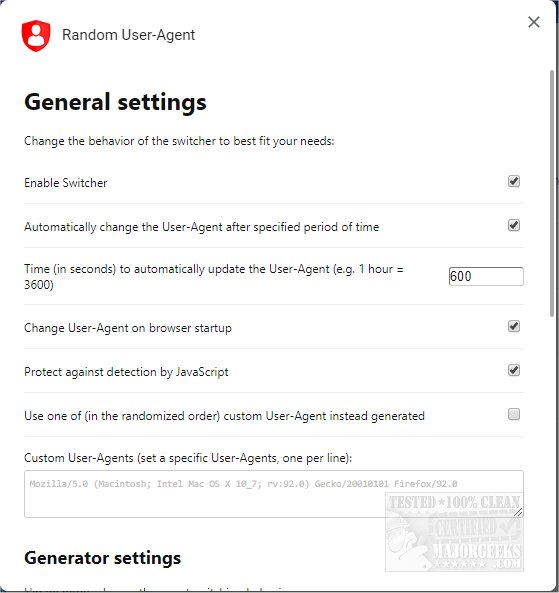The Random User-Agent extension for Chrome and Firefox has recently been updated to version 4.3.2. This tool enhances user privacy by replacing the original browser User-Agent string with a randomized one, effectively minimizing data leakage. The extension automatically alters User-Agent strings after a set interval but also allows users to manually configure the strings if desired. It is designed to be lightweight, utilizing minimal system resources while offering customizable randomization options concerning the browsers and operating systems being spoofed.
Moreover, the extension includes an exceptions list with support for wildcards, allowing users to specify particular sites where they may want to disable randomization. In addition to protecting users from data tracking, Random User-Agent adds a layer of defense against JavaScript exploits, further safeguarding user identity and anonymity online.
A User-Agent string contains various information about the user's browser, such as the name and version of the browser, the operating system in use, installed plugins, and other identifying details. By randomizing this information, users can obscure their digital fingerprint, making it more difficult for websites and advertisers to track their online activities.
In line with enhancing user privacy, there are several related tips and guides available, such as how to start Google Chrome in incognito mode, methods to prevent Chrome from storing browser history, and instructions for managing saved credit card information across different browsers. Additionally, there is guidance on improving browser performance and opting out of features like Federated Learning of Cohorts (FLoC) in Google Chrome.
Overall, the Random User-Agent extension serves as a vital tool for users looking to enhance their online privacy and reduce the risk of unauthorized data collection while browsing
Moreover, the extension includes an exceptions list with support for wildcards, allowing users to specify particular sites where they may want to disable randomization. In addition to protecting users from data tracking, Random User-Agent adds a layer of defense against JavaScript exploits, further safeguarding user identity and anonymity online.
A User-Agent string contains various information about the user's browser, such as the name and version of the browser, the operating system in use, installed plugins, and other identifying details. By randomizing this information, users can obscure their digital fingerprint, making it more difficult for websites and advertisers to track their online activities.
In line with enhancing user privacy, there are several related tips and guides available, such as how to start Google Chrome in incognito mode, methods to prevent Chrome from storing browser history, and instructions for managing saved credit card information across different browsers. Additionally, there is guidance on improving browser performance and opting out of features like Federated Learning of Cohorts (FLoC) in Google Chrome.
Overall, the Random User-Agent extension serves as a vital tool for users looking to enhance their online privacy and reduce the risk of unauthorized data collection while browsing
Random User-Agent for Chrome and Firefox 4.3.2 released
Random User-Agent for Chrome and Firefox replaces the original browser User-Agent identifier with one that is randomized.
Random User-Agent for Chrome and Firefox 4.3.2 released @ MajorGeeks


